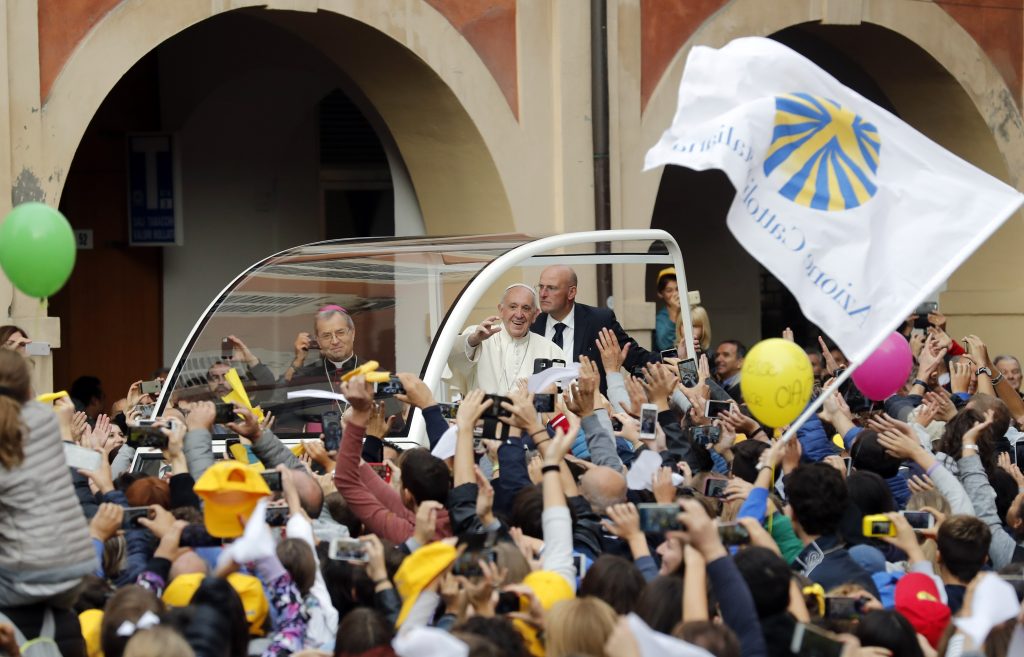This material belongs to: CRUX.
Speaking in the north-central Italian town of Cesena on Sunday, Pope Francis outlined his own version of “Profiles in Courage,” outlining what he sees as the core of virtuous politics: A kind of politics that’s “neither a servant nor an owner, but a friend and collaborator … neither fearful nor reckless, but responsible and therefore courageous and prudent at the same time.”
ROME – Pope Francis on Sunday blasted corruption as the “termite of politics” because it doesn’t permit a society to grow, and described every good politician as a kind of “martyr” to service because he or she must be willing to set aside their own ideas and desires to seek the common good.
A good form of politics, the pope said, is “not subservient to individual ambitions or powerful factions and centers of interests,” drawing strong applause from a crowd in the central square of the Italian town of Cesena, where the pontiff was making a brief pastoral visit.
Francis called for a kind of politics that’s “neither a servant nor an owner, but a friend and collaborator … neither fearful nor reckless, but responsible and therefore courageous and prudent at the same time.”
The pope’s remarks came in what was billed as a “meeting with citizenship,” which basically meant the population of Cesena, a city of about 97,000 people in Italy’s north-central Emilia-Romagna region.
Good politics, the pope continued, “encourages involvement of people, their progressive inclusion and participation.” It doesn’t leave anyone at the margins, he said.
A pope known for his environmental leadership, including publishing the first-ever encyclical letter devoted to the care of creation in Laudato’ Si, also added a “green” note to his profile of good politics.
Such a form of politics, he said, “doesn’t plunder and pollute natural resources, which aren’t a bottomless well but a treasure given to us by God to use with respect and intelligence.”
Francis called all this the “authentic face” of politics, and said it’s the reason that the social doctrine of the Catholic Church considers politics “a noble form of charity.”
Cesena’s Piazza del Popolo, or “Square of the People,” was jam-packed for the pope’s brief stop in the city Sunday morning, lasting about an hour and a half before Francis moved on to the larger nearby city of Bologna.
Francis drew his strongest applause from the enthusiastic crowd when he called on politicians to purse the common good and to reject “even the most minimal form of corruption.”
Frustration with corruption scandals is a common theme of Italian political life, recently inspiring the populist Cinque Stelle, or “Five Star” movement to shake up the country’s political establishment – only to see some of its anti-establishment leaders become embroiled in corruption scandals of their own after taking public office, including, at the moment, the Mayor of Rome, Virginia Raggi.
Frequently veering off-script, Francis added an impromptu reflection on corruption Sunday morning.
“Corruption is the collapse of politics, because it doesn’t allow the society to grow,” he said. “A good politician always ends up as a sort of martyr, because he or she must let their own ideas and desires go in order to seek the common good.”
The official purpose for Francis’s brief stop in Cesena was to recall the 300th anniversary of the birth of Pope Pius VI, an 18th century figure who condemned the French Revolution. When he refused to renounce his temporal power, Pius was arrested and taken into exile in France, where he died in August 1799.
After his session in Cesena’s main square, he headed to the local cathedral for a session not just with priests, religious and seminarians, but also lay members of pastoral councils and representatives of parishes.
In addition to a more spiritual reflection on evangelization and a “revolution of tenderness,” the pontiff also offered some practical pastoral advice – including that while it’s fine to talk out disagreements, he said, one thing is out of bounds: “Never gossip! Never gossip!”
“Gossip is a terrorist act … it destroys communities,” he said. “It’s a bomb that destroys you and the people around you.”
In Bologna, Francis is scheduled to meet with immigrants, workers, university students and faculty, and a group of priests, religious and seminarians before saying a farewell Mass in the evening.


